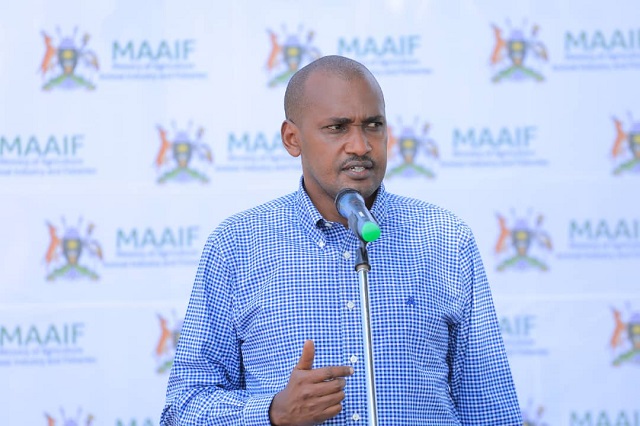
Kampala, Uganda | THE INDEPENDENT | The Minister for Agriculture, Animal Industry and Fisheries, Frank Tumwebaze is discouraging donors from giving his ministry cash.
Tumwebaze said cash donations are tempting and also items to be procured could take longer because of the procedures that must be taken such as domestic and international bidding among others.
He made the statement on Tuesday after receiving desert locust support equipment from the Japan International Cooperation Agency-JICA, and the United Nations Food and Agriculture Organization-FAO at the ministry’s head offices in Entebbe.
Tumwebaze said the motorbikes will be given to extension workers to sensitize farmers and communities about crop and animal protection activities across the country since desert locusts were successfully eliminated last year. But he cautioned that all should be on standby for any invasion of desert locusts in Uganda.
Stephen Byantwale Tibeijuka, the Commissioner for Crop Protection at the agriculture ministry agreed with Tumwebaze saying the donations are worth a total of 3billion shillings and the equipment could have taken a minimum of six months to be procured and delivered in Uganda.
He said the trucks will be stationed at Soroti Flying School and Moroto Airstrip where the desert locust central response units have been set up for the areas affected or threatened by the crop pest.
Antonio Querido, the country representative of FAO, said the agency has today donated 2 light-duty trucks (Howo make) for transporting equipment and pesticides, a Toyota Land Cruiser, and four motorbikes among other items.
The agency has since last year donated pesticides against desert locusts, Foot and Mouth Disease vaccine doses, personal protective equipment and given 750,000 shillings to each of the 11,881 households affected and threatened by desert locusts to meet their food and other basic needs. The cash handouts roll out lasted six months.
FAO made the donations in a bid to support Uganda’s efforts to control desert locusts and other crop pests in the future. Querido said the invasion last year affected close to 750,000 households in Northern and Eastern Uganda between January and September 2020.
Unlike Ethiopia, Somalia, and Kenya that were hard hit by the desert locust invasion, Querido said the impact was not as much in Uganda.
He however said the experience in those three countries should teach Uganda to prepare for the worst in the near future.
Ichiro Fukuhara, the JICA senior representative said the Japanese government has today donated three heavy-duty trucks (Isuzu make) towards supporting Uganda’s efforts in controlling desert locusts. The government donated 22 motorbikes early this year to the ministry for the same purpose.
Fukuhara said the donations reflect his government’s support to Uganda’s desert locust response efforts and it is also a continuation of their long-standing cooperation for development and protection of the agriculture sector.
Japan currently supports the implementation of the Promotion of Rice Development Projects phase one and two, Northern Uganda Farmers’ Livelihood Improvement Project, the project on Enhancing Diagnostic Capacity for Animal Disease Control, and two irrigation development projects in Atari River Basin area.
It also dispatched Agriculture Planning Advisors to the agriculture ministry 13 years ago, to support Agriculture policy formulation and implementation, Knowledge Co-Creation Program-KCCP. The KCCP has resulted in the training of several agricultural officers in Central and local government in a bid to boost agricultural productivity and production.
*****
URN
 The Independent Uganda: You get the Truth we Pay the Price
The Independent Uganda: You get the Truth we Pay the Price


